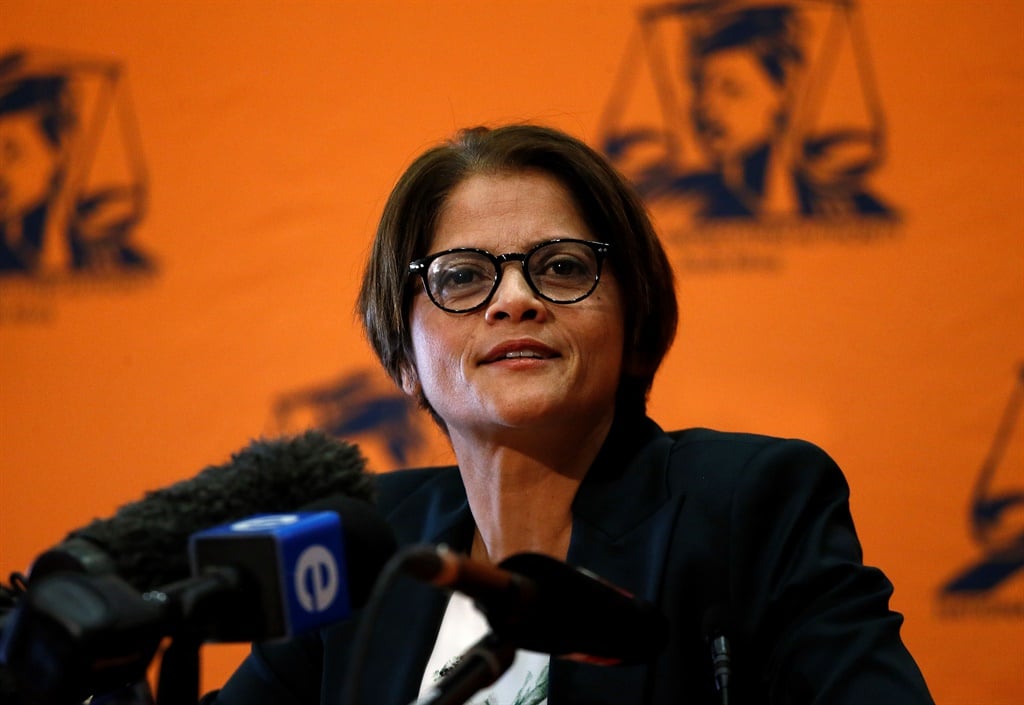


Advocate Hermione Cronje.
Phill Magakoe, Gallo Images
- Advocate Hermione Cronje says her number one priority is “cleaning up law enforcement”.
- Cronje says law enforcement agencies need to regain the confidence of South Africans.
- She says her team is working hard to track evidence.
Advocate Hermione Cronje, the head of the National Prosecuting Authority’s Investigating Directorate, says law enforcement agencies should do its job and regain public trust.
“For me, the number one priority remains cleaning up law enforcement… we need law enforcement to do its job, we need law enforcement to get back on top and regain the confidence of the South African public, so that remains my number one priority,” Cronje told News24 on Wednesday.
President Cyril Ramaphosa amended the regulations of the state capture commission – giving the commission’s staff the go-ahead to work with law enforcement.
The amended regulation also helps to facilitate the sharing of information between the agencies and the commission.
Cronje saw this move as a boost to morale and energy, adding her office can now directly employ the staff from the Zondo commission in order to speed up prosecutions.
She said:
I am as frustrated as the next person, I live in this country. I have to talk to my family members who are beyond frustrated with the fact that they don’t see action. They don’t see the products of the efforts we are putting in.
“We have a number of matters in court, but what the public is dissatisfied with is that they don’t get us to the top. They don’t get us to the people most implicated and we are acutely aware of that.”
Cronje said her team is working hard to track evidence and reveal how certain individuals have benefitted.
READ | NPA not reliant on Zondo commission to investigate state capture allegations – Lamola
She said her focus is on cleaning up the South African Police Service – from brigadiers, generals to high-ranking officials, who are involved in serious corruption. She added that this makes them vulnerable to assisting those who should be held accountable.
She also said they have a number of cases on the court roll, where a number of high-ranking police officials are facing corruption charges.
“But, again, there, we need to get to the next level; we need to get to the people whose job it was to stop that.
“Whose job it was, and ability it was to arrest. We have to deal with why they didn’t do that.
“So, in the security sector focus area, we have done a number of prosecutions [and] we have a number of prosecutions on the cards. But it is building that case going higher up the food chain that this capability we are going to get now is going to support.”
Cronje said there were also difficult cases, where not all their colleagues deserved to be “rounded up and put behind bars” – but there were elements that had been captured and that is an important case for her team.
Her team is also looking into state-owned entities – focusing more on Eskom and Transnet, she said.
“Those are the two we focused on because of our resource constraints. There are many others and the cases are screaming at us, but we have a limited capacity, so we had to prioritise.”
The Investigating Directorate (ID) had recently been granted an order, which restrains alleged Gupta “fixer” Kuben Moodley and his letterbox company, Albatime, from dealing with R232 million worth of assets.
This is the amount the ID alleges Moodley and his company received as kickbacks from the Regiments Group of Companies relating to contracts that were improperly awarded by Transnet and by the Transnet Second Defined Benefit Fund.
Cronje said businessman Salim Essa was part of the network and they were working on trying to secure evidence and court attendance.
Cronje also touched on the Estina Vrede Dairy Farm project, saying her team has put in a monumental effort to move the case forward to make sure the people, who are accountable, are not just the people at the lower end of the spectrum.
She said they need to get to the bottom of who is accountable, responsible and who benefitted from the project.
“That case is developing, but, as everyone knows, the case has had the challenge of complex financial flows that goes through a number of jurisdictions and that has taken us quite a while to unlock.
“We have simultaneously pursued an alternative line that helps us prove or disprove the complexity of those… which, again, the Zondo commission will hugely facilitate in reaching finality on that.
“As soon as I get to deploy the Zondo capacity on [what] I am pursuing and get them to give me those results, I have a charge sheet and I have to satisfy myself that evidence will stand the test of serious scrutiny in court.”

